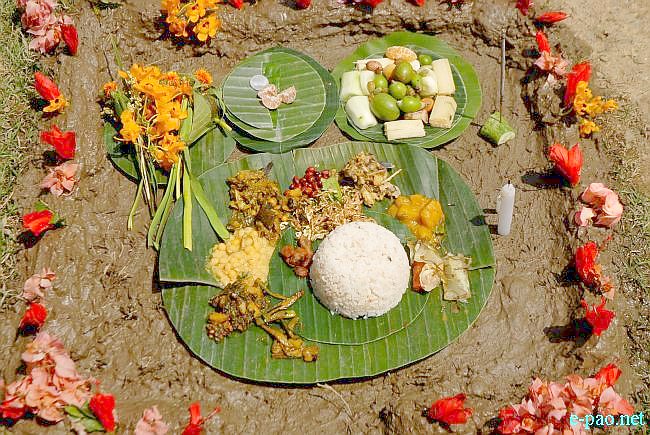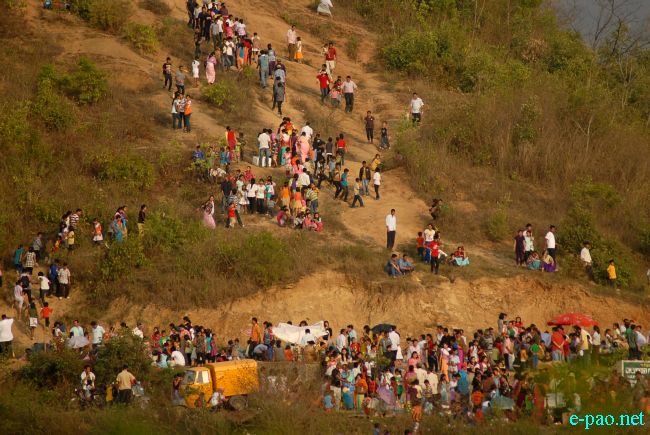Sajibu Cheiraoba New Year Observation of Meeteis
Dr N Birachandra *

Preparation of food, cooking , offerings to God and eating together - all as part of Sajibu Nongma Panba Chiraoba in Imphal on April 04 2011.
Like other peoples of the civilized world, the Meeteis also observed the New Year with pomp and grandeur accompanied by a number of rituals in succession in the month of Sajibu (March-April). The local name of the festival is Sajibu Cheiraoba, which is held on the Ist day (Lunar) of the month of Sajibu. The Meeteis are religious minded people and so, the New Year celebration is held with a series of rituals, viz
- Cheiraoba (Cheithaba),
- Kongba Leithong Phatpa Sajibu Leikhun Phunba,
- Veneration of all important deities of the state,
- Saroi Khangba and
- Shing Tek-Shing Satpa.
These items can be studies as under:
Cheiraoba: As stated above the New Year observation is held on the first day of the month of Sajibu (March-April). The era which is now adopted is Chandrabda. We cannot say exactly from which period the era of Chandrabda was introduced. The recording in Cheitharol Kumbaba was started from the time of King Kyamba (15th century AD) and he used the era.
But the counting of the year and observance of New Year was in vogue from time immemorial, right from the time of one Mariya Phambalcha (BC). The era which was introduced by Mariya is also in obscurity, but it is very much resemble to Pandava era or Yudhistiradabda. So far as the recordings of the Chetherol Kumbaba are concerned, the compilers had used Saka-era from Nongda Lairen Pakhangba upto 1495 AD, before the introduction of the Chandrabda.
So, from above facts we may conclude that, the Meeteis used different eras, viz, Pandava era, Saka era, CHandrabda era, etc in different periods of their history. Now coming to the present theme (Cheiraoba), the ceremony was performed by the king during the kingship days at the state level on one hand and by the individuals in their capacity.
State function: At the state level celebration, the king used to proclaim that the old year has passed and the New Year has arrived. The Lakpas of the four Leikais, viz, Kwai, Yaiskul, KHurai and Wabgkhei used to go about riding on the horse back with a stick attached with a bell at the tip. They rang the bells and cried out that passing of the old and the coming of the New Year. Hence, the ritual was known as Cheiraoba. Chei- stick, Laoba- Cry, thus meaning to cry out to inform the people of the coming of the New Year by holding a stick with bell. Probably, the system came into existence in the early part of Christian era when Ningthouja clan firmly occupied the above four villagers.
The system continued upto the reign of King Kyamba. But from (1407-78) to 1495 AD, a new system was introduced by King Kyamba. The old system was dropped and a person was appointed and that person declared the coming of New Year before the king and the public who attended the function. At the same time, he also promised that he would take over the risk of all misfortune that might befall the king and the state. The king rewarded him with the exception of state duties of the concerned year and others.
In the next year, a new person substituted for the former with due rite of handing over and taking over the charges along with the declaration of the New Year. Declaration to the villages by ringing the bell on the top of the stick was dropped. It will be interesting to note that the person, i.e., Cheithaba, who took the responsibility of bearing the misfortune, again handed over the misfortune to a cock by performing the rite of Usil.
The system continued till date without any changes. The only change that we witness after the Hindunisation is that the ceremony was held before the Hindu God like Govinda. The king then venerated all the important deities of the state by offering new robes, fruits, vegetables, rice, flowers, etc, to give a prosperous year and long life.
Kongba Leithong Phatpa and Sasibu Leikhun Phunba: It was a ritual performed in continuation of Cheiraoba for divining good and bad things that might happen in the ensuing year. It was performed on the 7th day of Sajibu at the abodes of the two deities, i.e. Ningthempokpa (Sentreng) and Angompokpa (Kuptreng) at Kongba. It is said that in the early days, the ceremony was held inside the Kangla.
The two gods (Ningthempokpa and Angompokpa) were venerated with due rites, the earth were dug with a spade and worms and insects, etc, were collected from the opening hole. The collected worms or insects were placed at the abode of Yumjao Lairembi for five days in a pot. The goddess is requested to give punishment if ever they represent evil spirits.
Then the matter was informed to the three Kurus, viz, Mangang, Luwang and Khuman. After keeping the insects, worms, etc for five days, it was consigned to Heipok River. The ritual is known as Kongba Leithong Phatpa (opening the earth at Kongba). This is not only the divination of good and bad omens, but also a ritual oblation to destroy all the evil influences. The hole that had been dug up earlier was again covered with earth with due rites. This ritual is called Sajibu Leikhun Phunba (refilling the hole in the month of Sajibu).
After filling the hole, some paddy seeds were thrown there with due rites and there also after the growth of the plants, omen was sought. It was believed that the ritual blocked the road of the evil spirits in the coming year. These two rituals were performed by remembering the event of coming out of a God called Lairenthingkaklemba from inside the earth and forcing him to return by filling the hole from where he came out.
Saroi Khangba: In the late evening, about the time of dusk of the New Year, the king's priestess (Maibi) propitiated the evil spirits called Saroi. They were the most feared evil spirits among the Meeteis. As stated above, there are sixty-one such spirits. To appease or placate them, some share of food which comprises rice, vegetables, fruits, coin, etc, were offered at the outskirts of the capital and they are begged not to give any harm and destruction with due rites. The ritual is known as Saroi Khangba, i.e, to give the share of the Sarois (Goblins).
Singthekpa (Singthaba) and Singsatpa: It was a ritual performed in relation to Cheiraoba. It was a ritual prayer to ward off mortality and insecurity during the coming year. But now-a-days, became an outdated culture.
It was believed that all the gods assemble at Chinga hillock on the Ist Saturday of Lamta (March-April) to estimate the numbers that may die that year in the country. In this assembly, they count the number of persons by putting sticks; hence the ritual is called Shingthekpa or Shingthaba.
To escape from such enlistment, the king's priests performed a ritual called Shingshatpa at Heipok hillock praying the deities particularly for the royal family, so that no death and ailment may occur. This ritual was performed at Heipok hillock one day before Cheiraoba in the night. The ritual was performed only for the royal family. For the whole country, a ritual called Usin was performed at the above abode.
On the day of Cheiraoba each and every individual of the royal family was given a piece of reed covered by silk thread, which was used in the ritual at Heipok. The individual person ought to keep it intact for the whole year as if it were his or her soul.

Cheiraoching kaba - all as part of Sajibu Nongma Panba Chiraoba in Imphal on April 04 2011.
Observance of New Year by the Individual family: At every household, Lainingthou Sanamahi and Laimaren Sidabi are worshipped. New robes are offered to them. The Ishaiphu of Laimaren (water pot of the goddess) is filled with fresh water. These two deities are worshipped with offerings of Athenpot comprising rice vegetables, fruits and flowers, particularly Kusumlei (Carthemus Linctorius), Kombirei and Leiri.
Someone used to perform the ritual of Usin by representing the souls by an equal number of Ngamu (Channa Orientalis, Block & Schneider) at the abode of Sanamahi on this day. The worshipper cooks the rice and vegetables and offers some portion to certain deities and partake the rest. One or three dishes of the meal according to their choice is placed at the gate of every household by way of offering to the deities (Khunda-Hanha), viz, Lamaba, Tumaba, Lamsenba, Tusenba, Hanba Kokchao, Hanba Leikham, etc, or the deities in charge of the past, present and future years.
They were entrusted to protect the fanmily from the bad effects of the year and prayed for the welfare and prospertity of the family. On this day, different items of curry are prepared and shares are given to other members or nearby relatives and vice-versa for hearty meal. In the evening, the youth and children climb certain hillocks in their respective areas which they called Cheirao-ching and prayed the deities there. So, it is an exciting scene to see.
On the day or the day before the ceremony, houses are cleaned and new cooking pots used to replace the old ones when the Meeteis used earthen posts for cooking purposes. But now-a-days, all the utensils are cleaned. Bathing and ablution was done at particular places or ablution was done with the water collected from certain sacred places mixed with some leaves and herbs. It was accompanied by the rites of Amanathou, Naheiron and Irulaisol, etc. But such practices are hardly seen these days.
All the occupational works including the Lallup were prohibited or five days from the date of Cheiraoba during the kingship days. It was known as Silhenba, i.e. to stop the works. During these five days, people spend their time in merry making such as game of Kang.
Changing patterns of Cheiraoba: Some scholars are of the opinion that before Nongda Lairen Pakhangba (Ist Century AD) the ritual of Kongba Leithong Phatpa and Sajibu Leikhun Phunba was performed inside the Kangla. From the time of Nongda Lairen Pakhangba, the ritual has been performed at the present abodes of Ningthempokpa and Angompokpa at Kongba. It needs further investigation to know whether it was introduced by Nongda Lairen Pakhangba or his successors.
Again, from the time of King Kyamba (15th Century AD), the practice of crying out with sticks has been stopped and the system of Cheithaba was introduced. Yet, this ritual is still remembered as Cheiraoba though its patterns have changed considerably.
With the influence of Hinduism, the day of performing Cheiraoba was changed from the Ist day of Sajibu to the day of Charak Pujah of the Hindus of Northern India. Instead of praying to traditional deities, more attention was drawn towards worshipping of Hindu deities.
Lastly, during the last few years, revivalists have started observation of New Year (Cheiraoba) on the first day of Sajibu. The state government has also declared the day as State holiday.
* Dr N Birachandra wrote this for Hueiyen Lanpao (English Edition)
This article was posted on March 22, 2012.
* Comments posted by users in this discussion thread and other parts of this site are opinions of the individuals posting them (whose user ID is displayed alongside) and not the views of e-pao.net. We strongly recommend that users exercise responsibility, sensitivity and caution over language while writing your opinions which will be seen and read by other users. Please read a complete Guideline on using comments on this website.







